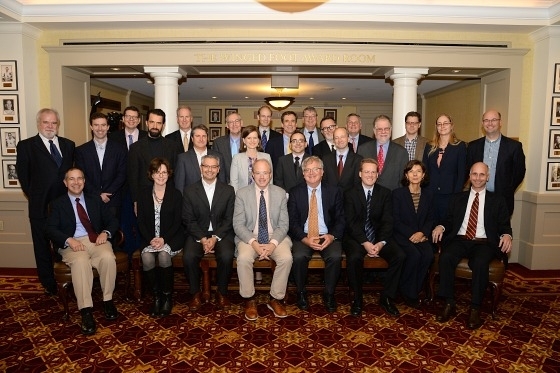
The first meeting of the Center for Law and Religion's Tradition Project, “Tradition in Law and Politics,” took place at the New York Athletic Club on October 20-22, 2016. The meeting, which was keynoted by Professor Michael W. McConnell of Stanford Law School, brought together legal scholars, judges, political theorists, historians, and journalists for a sustained round-table discussion over two days.
The Project, a three-year research initiative, seeks to develop a broad understanding of what tradition might continue to offer for law, politics, and responsible citizenship, and explores the relationship between tradition and change in today’s world. The Project is supported by generous grants from the Lynde and Harry Bradley Foundation and the Achelis and Bodman Foundation.
View the Conference Keynote Lecture
View the Conference Photo Gallery
Professor McConnell’s keynote lecture, “Tradition and the Constitution,” explored the value of tradition generally—as a coordinating mechanism, a democratic check on state power, and a depository of values and practices that survive over time—and then moved to a discussion of tradition and change in constitutional interpretation. Professor McConnell focused on particular controversies that illuminate the importance of tradition as a tool for discovering the meaning of the constitutional text.
“Professor McConnell’s lecture was profound and wide-ranging,” said Center Director Mark Movsesian. “It drew from his deep learning on constitutional theory and history, and made a persuasive case for tradition’s continuing value in constitutional law today.”
The lecture was followed by two days of workshops in which conference participants discussed selected readings on the meaning of tradition generally; the American religious tradition; the American political tradition; tradition in the common law; and tradition in constitutional law. Discussions were led by moderators who had chosen the readings. Among the specific topics considered were the relationship of tradition and reason and the conflict between tradition and individualism in the American religious, legal, and political experience.
Participants found the workshops extremely fruitful and suggestive of further work. “What a great conference this was, and how important and relevant to our time,” observed blogger Rod Dreher. Professor John O. McGinnis from Northwestern University Pritzker School of Law also found the program pertinent to vital issues of the day. “The Tradition Project’s conference on law and tradition was enormously valuable,” he said. “Tradition is an important source of law, but it is almost ignored today in legal scholarship on both the right and left. The participants in the conference began to develop strategies for restoring tradition as an essential element in law—a restoration necessary to maintain the foundations of ordered liberty.”
Tradition Project in the Media
Among the Project’s outputs will be scholarly contributions, including books, journal articles, and curricular development, as well as media and online contributions. Some of these have already begun to appear:
- Rod Dreher, Tradition and Law
- Rod Dreher, The Tradition Conference
- Rick Garnett, The Tradition Project Meeting
- Paul Horwitz, Tradition Project Conference: Tradition in Law and Politics
- John McGinnis, The Distinction Between Constitutional Law and Constitutive Traditions
- Michael Moreland, Tradition and Reason
- Marc DeGirolami, A Thought for Michael on Tradition and Reason (in response to Moreland)
- Richard Reinsch, Tradition in a Scattering Time
- Kevin Walsh, Tradition as part of what it means to be fully human
Next Steps
Planning is underway for the second component of the Tradition Project, “Tradition and Culture,” which will take place next year in New York. The final session, “Tradition and the Global Clash of Values,” is scheduled for Rome in 2018.
For more information about the Project and other Center for Law and Religion activities, please contact the Center’s Director, Mark L. Movsesian, or its Associate Director, Marc O. DeGirolami.
Related News
Dean Jerrold Ross Conference Room Unveiled
On Tuesday, December 10, the newly renovated conference room on the fifth floor of Sullivan Hall was dedicated in honor of Jerrold Ross, Ph.D., former Dean of The School of Education . The renovation...
Institute for Catholic Schools Provides Educational Resources to Local Catholic School
The Institute for Catholic Schools (ICS) in The School of Education at St. John’s University recently donated approximately $2,800 worth of academic and sensory learning tools to Father Vincent...
Meet Anna R. Lukachik ’80Ed, Pietas Medal Recipient
At St. John’s University’s annual Alumni Convocation on October 18, Anna R. Lukachik ’80Ed received the Pietas Medal, an award that honors exceptional alumni for their service and achievements...
